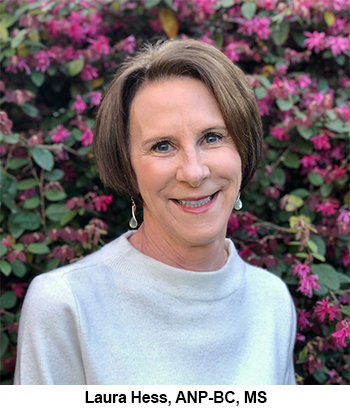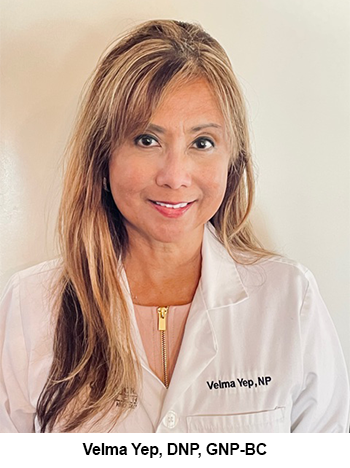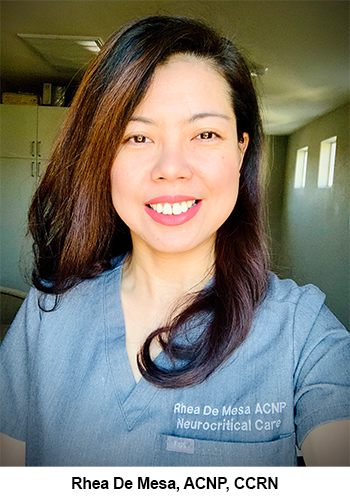By Dorsey Griffith
Contributing Writer
News sites are filled with urgent stories about overworked, exhausted and frustrated health care providers. They weathered the COVID-19 storm for over a year, but when they thought the pandemic was nearing an end the delta variant burst on the scene, sickening legions of people – most of whom had refused to get vaccinated against the virus..png)
Terms like “burn-out” and “empathy fatigue” are commonly being used to describe what many providers are feeling these days. Connections asked CANP members how they’ve coped and spoke to two veteran NPs whose personal experiences helped them to navigate the pandemic and to guide others to find their own inner strength and peace of mind amid an uncertain and chaotic time.
Terry McGarvey, MSN, FNP-C, RNFA is an NP specializing in head and neck surgery at Kaiser Permanente in Sacramento. Years ago, she experienced a traumatic event, which led to depression and PTSD. When the pandemic struck, she said, it felt the same, only worldwide.
With the impacts of COVID-19, both providers and patients are experiencing trauma, she said.
“We now have 21 months with this worldwide traumatic event, and we are saying, ‘We didn’t have to be here. We don’t have to have as many patients in the hospital as we do.’ We thought we were going to be back to normal. We are losing predominantly unvaccinated people, but these are our patients. That’s hard on providers. Our job is to make things better for them, and if we can, cure them. It’s a rough place to be.”
She emphasized that providers need to know it’s OK to not be OK.
“When you’re a provider – an NP, PA, MD, whoever, there is an expectation that you are going to show up and you are going to be of the ones who is going to make decisions and be there for others,” she said. “It’s sometimes hard to acknowledge out loud to others that I am not doing well. We are enculturated to do just the opposite – we have to press on, forge forward.”
By the same token, she added, “Patients are extremely irritable and depressed. A lot of people have had to be socially isolated, and they have no experience dealing with trauma.”
Those who are refusing to be vaccinated for instance, are frightened, either of the notion that someone else is controlling their life or of the vaccine itself.
“Fear is part of the trauma experience, and a lot of people don’t know how to manage that or the emotions it brings up.”
While not unscathed by the enormity of the COVID crisis herself, McGarvey said having honed coping skills in the aftermath of her personal trauma she has fared better than some and was able to share her learnings with colleagues.
For McGarvey, learning how to be present, to be mindful, was the most important coping mechanism she tapped when the pandemic took hold and the stress response kicked into gear, which she noted can cause a cascade of physical and emotional problems. She describes mindfulness as the practice of listening to your body, making adjustments accordingly, and then applying that same practice to whatever is happening in your life. 
To help colleagues in her department she offered lunchtime meditation breaks and “shake-it-out” exercises in which she’d put on lively music and lead the others in shaking every part of their body.
“You’re letting it all go,” she said. “The point is that you are not having to hang on to things. There is no right or wrong way to do it. It’s a simple, quick and easy way to reduce stress.”
Laura Hess, ANP-BC, MS, is retired after a long career as a nurse practitioner, most recently at Sutter Health in Primary Care Internal Medicine.
Today, she works as a certified mindfulness teacher with her husband, Kevin Walsh, MD, also recently retired. Her longstanding practice became even more valuable after experiencing significant pain related to a herniated disc, which made her far more aware of how medical problems often overlap with psychological or emotional problems.
In addition to teaching, Hess and Walsh volunteer with the Sacramento County Public Health Department answering calls on the COVID-19 hotline. Hess has found that the skills she has learned are exceptionally helpful when responding to vaccine-hesitant callers.
“We have learned to use our mindful communications skills to listen to the person, whether we agree or not. We acknowledge whatever emotions they have. We understand that these people feel strongly, and are emotional, and they are suffering because they feel this is being pushed upon them.”
To manage her own emotions when people are angry, Hess said she grounds herself and gets in touch with her feelings.
“I can take that energy and hold it somewhere, whether in my hands or focusing on my breath. I take the frustration, irritation or anger and be with it and at the same time understand that this person is suffering, and I listen to them from that place of compassion rather than judgment. This doesn’t mean it isn’t difficult.”
She said it’s no different in a clinic setting in which a patient has entrenched anti-vaccination views. She said it’s helpful to take a moment and consider: “What is important to you with this patient? What are your values: Who do you want to be in this interaction?”
Hess suggests providers “get curious, not furious.” While you may not change a patient’s mind, she said, the patient will know you have  listened to them, and the next time you might make more progress.
listened to them, and the next time you might make more progress.
She also suggests setting a daily intention and checking in it with throughout the day, as well as practicing gratitude both on a personal level and in the work setting.
“With gratitude we strengthen the positive qualities within our heart and are more connected to others, and we feel inspired and uplifted. This is how we build resilience."
Velma Yep, DNP, GNP-BC, president of the CANP Inland Empire chapter, was getting her DNP at UCLA when the pandemic stuck, turning what was supposed to be an in-person program into a program largely conducted via Zoom.
“It was very challenging,” she said. In addition, she felt estranged from her older patients, many of whom were not comfortable using telehealth for visits. And then, her mother was diagnosed with breast cancer. The combined developments were tough.
To cope, Yep adopted a second dog, took long walks and turned to a phrase she remembers from writer Vivian Green: “Life isn’t about waiting for the storm to pass… It’s about learning to dance in the rain.”
She also relied on her Catholic faith. That meant attending masses online, and when vaccines became available gently nudging others in her church community toward science-based facts. She reminded vaccine-hesitant people of the role vaccination played in eradicating diseases like smallpox and polio.
“At the end, they kind of opened their minds,” she said.
After a 17-year career as an RN, Rhea De Mesa, ACNP, CCRN, decided to become an NP, enrolling at Grand Canyon University while also working full time at UC Davis Health and per diem in the ICU at Sutter Health Medical Center. She had just started her new career as an NP in the Department of Neurocritical Care at Sutter when the pandemic hit.
“My supervising physician was seeing patients online and via Facetime, and I was assisting him by holding the iPhone in front of the patient so he could make an assessment instead of both of us conducting the exam at the bedside,” she said.
“There were times when we would depend on the RN’s neurological assessment while they were in the room to save on PPE and to minimize exposure. At that time, vaccines weren’t available, and PPE was scarce. This made my care impersonal because I was relying on somebody else’s assessment.”
The impact was heartbreaking for her.
“My care is always personal. It’s hard to be there for them. How do you comfort them? How do you touch them, make them feel like you are supporting them? I cried for a week.”
To get her footing, De Mesa spent more time researching the diseases she was treating so she could be certain that she’d done everything she could for every patient. She became an editor for a neuroscience newsletter and devoted two pages per issue to self-care. And she talked a lot with colleagues and her supervising physician at the start of each day.
“I’d be in my car and say a prayer, and after work I’d say my gratitude,” she said. “For example, I was able to help my stroke patient who was aphasic and now is talking again. Gratitude makes me go on and feel that the work I do matters. We are helping people. If you know you are helping the family, that you are helping the patients, that is my number one motivation to go back to work.”
Other CANP members shared their own strategies for self-care and resiliency. They included:
- Buy and use a Peloton
- Participate in a virtual paint night
- Use mindfulness and fitness apps and other online support including:
- Walk a dog
- Cook healthier meals at home
- Seek health and stress management tips from health care systems
- Seek psychological or psychiatric help for anxiety and depression
- Get acupuncture
- Reconnect with old friends
- Do some journaling
- Get out of the house. Some ideas:
- Virtual travel experiences
- Set boundaries
- Garden
- Adopt kittens
- Volunteer:
- Find a support group:
- Play volleyball
- Get peer support
- PeerRXMed is an app that facilitates peer support